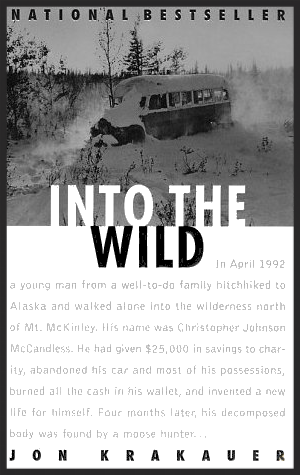The only time I ever ventured into the wild was during my junior year in high school when I and three friends spent Spring Break backpacking in the Sierra Nevada Mountains in California. We packed in all of our food though and didn’t have to hunt or forage. We had a cozy four person tent, a huge first aid kit carried by the aspiring medical student, a topographical map, good weather, and each other, so this was nothing like what Christopher McCandless, Everett Ruess or Jon Krakauer did in their youth. We did experience a harrowing moment when our narrow mountain trail became completely covered by a wall of hard-packed snow and ice that extended up the slope and formed a cornice that hung over us like a white tidal wave frozen in time. Our trail, barely wide enough for a single person, dropped steeply on our right in what seemed like a sheer cliff. To our left and up was a steep slope of solid rock. We could turn around and head back, maybe try to find another route over or around the pass, or we could traverse the wall of ice. Since we were sixteen and stupid, we chose the latter.
I removed my forty-pound pack, unsheathed the hatchet I’d earned six years earlier as a Boy Scout, and slowly shimmied across the snow wall, using the hatchet to dig footsteps and handholds. Two decades later, I look back on this moment of foolish decision and shake my head. We did not have an ice axe, nor did we have crampons. We had no business attempting a lateral crossing of a wall of packed snow when there was nothing beneath us but a vertical chute a few hundred feet long terminating at a field of jagged rocks.
About halfway across the trail I was digging, one of my footholds gave out beneath me. I felt myself begin to fall and heard one of my friends call my name. Fortunately, I managed to catch myself and clung to the wall, trying to force myself to breathe. I glanced at my friends who were looking at me with mixed expressions of relief, horror, and amusement. “Avoid this footstep,” I joked, and continued the rest of the way across. It was the closest we came to disaster on that trip.
I mention this story only as a feeble attempt to pretend like I have any idea what Christopher McCandless may have experienced during his fatal journey. In reality, we can only speculate based on the clues he left behind, the notes he scrawled on the walls of his shelter, and by what author Jon Krakauer was able to piece together when he wrote the book.
I was inspired to read Into the Wild by my niece, Cristy. During a recent and far too brief visit, she lamented that she didn’t have anyone to talk with about the books she reads. “But dear niece, what about your absentee uncle who you see once every other year”, I cried. Shortly thereafter, she told me she’d just been assigned Into the Wild for school so I bought a copy the next day.
Prior to reading, I thought Into the Wild was only about Christopher McCandless, but it actually highlights several people cut from similar cloth as Chris including the author himself, and while I was initially irritated by what I felt were detours from the primary story, I came to realize these tangents were not included to pad the page count, but because they show the reader that Chris McCandless was not some kind of whack-job anomaly. There are plenty of others like him; people who just do not feel like they belong among modern civilization. These are people who were born in the wrong century. They are frontiersmen in a world without much of a frontier. While many people are quick to slap the crazy label on people like this, Krakauer speaks of these men in respectful terms, seeming to feel a kinship with them or at least he understands them more than the average person would.
Cristy asked me if I thought Chris McCandless was a visionary or an idiot. Personally, I don’t really think he was either, but she feels quite strongly that he was the former, citing his intensity and strength of his conviction, his attempts to persuade others to live as he did (he even succeeded in one case). I appreciate his adventurous spirit, but think he some of this actions were foolhardy. There is no doubt he believed in something but by the end of his experience, his philosophy seems to have changed. I enjoyed following his spiritual journey via passages he underlined in the books he carried with him. Toward the beginning of his adventure, he read books that romanticized life in the wilderness. He was excited but naïve, intelligent but unwise. At the end, perhaps reality had begun to sink in and he yearned for human contact, writing a personal note in the margins of his copy of Doctor Zhivago: “HAPPINESS ONLY REAL WHEN SHARED”. I think he intended to rejoin modern society, but Cristy is of the opinion that he wanted to start a family and share the freedom of wilderness living with them. We’ll never know.
McCandless’s story is inspirational, not in the “I want to do that” kind of way, but more because it is a story of a person who completely takes their life in their own hands and makes it exactly what they want it to be. In modern society, most of us do the old nine-to-five, mow-the-lawn, fold-the-laundry weekly routine. McCandless wasn’t up for that, wanted something different and made it happen. His story shows us that we can make big changes in our lives if we really want to. Just don’t discard your map.

